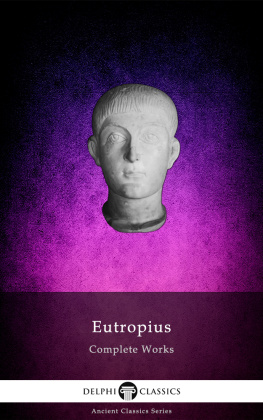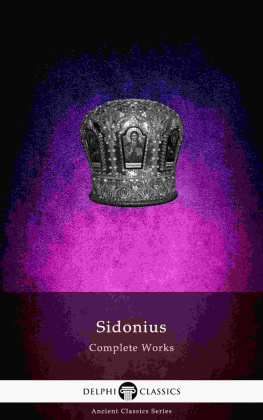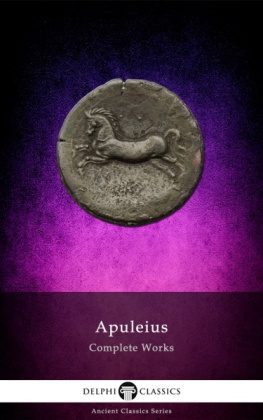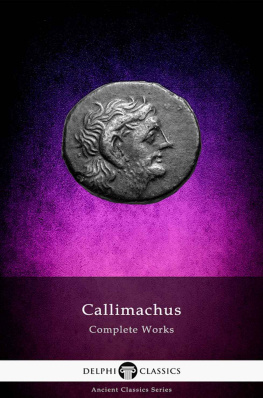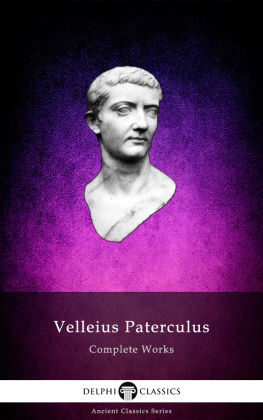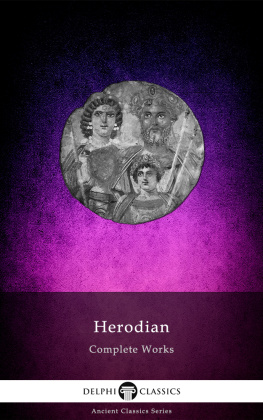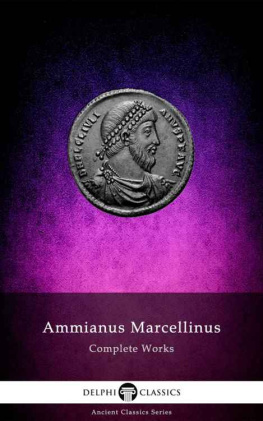
The Complete Works of
EUTROPIUS
(fl.fourth century AD)

Contents

Delphi Classics 2019
Version 1

Browse Ancient Classics







The Complete Works of
EUTROPIUS

By Delphi Classics, 2019
COPYRIGHT
Complete Works of Eutropius
First published in the United Kingdom in 2019 by Delphi Classics.
Delphi Classics, 2019.
All rights reserved. No part of this publication may be reproduced, stored in a retrieval system, or transmitted, in any form or by any means, without the prior permission in writing of the publisher, nor be otherwise circulated in any form other than that in which it is published.
ISBN: 978 1 78877 961 6
Delphi Classics
is an imprint of
Delphi Publishing Ltd
Hastings, East Sussex
United Kingdom
Contact: sales@delphiclassics.com

www.delphiclassics.com
The Translation

Bordeaux , south-western France Eutropius is reported to have been from Burdigala (Bordeaux), the capital of Roman Aquitaine.

Roman remains of an amphitheatre at Bordeaux

The Roman Empire in the time of Hadrian (c. 130 AD), showing, in south-western Gaul, the imperial province of Gallia Aquitania
Summary of Roman History

Translated by John Selby Watson, 1886
The Roman historian Eutropius flourished in the latter half of the fourth century A.D. He held the office of secretary at Constantinople, accompanied Julian on his expedition against the Persians in 363 and was alive during the reign of Valens (364378), to whom he dedicated his history. The Breviarium historiae Romanae is a compendium of ten books of Roman history, from the foundation of the city to the accession of Valens. It has come down to us complete and was compiled with considerable care from the best accessible authorities. The text was written with impartiality and in a concise, even simple style. It is particularly useful to historians for its account of the First Punic War, as no copy of Livys original books for that period have survived.
For the Republican period, Eutropius largely depended on an epitome of Livy, while for the Empire, he appears to have relied on Suetonius and the now lost Enmannsche Kaisergeschichte . For the final books, Eutropius probably made good use of his own personal experiences. The stylistic and methodological virtues of Breviarium historiae Romanae caused it to be much used by later Roman chroniclers. In particular, it received expanded editions by Paul the Deacon and Landolf Sagax. It was translated into Greek by Paeanius around 380 and by Capito Lycius in the sixth century. Although Eutropius text is known for its occasional idiosyncrasies, the plain and very readable style made it a favorite elementary Latin schoolbook for many years.

A marble bust representing Valens (328-378), who reigned as Eastern Roman Emperor from 364 to 378. He was given the eastern half of the empire by his brother Valentinian I after the latters accession to the throne. Valens was defeated and killed in the Battle of Adrianople, which marked the beginning of the collapse of the Western Roman Empire.

Portrait of Emperor Julian on a bronze coin from Antioch, c. 360 Eutropius accompanied Julian the Apostate on his expedition against the Parthians in 363.
CONTENTS

A sixteenth century depiction of Lucius Tarquinius Superbus, published by Guillaume Rouill. Tarquin, the last king of Rome, appears prominently in the first book of Eutropius Summary of Roman History.

Porphyry bust of Galerius (c. 250-311), who was Roman emperor from 305 to 311 and features in the final book of Summary of Roman History.
Dedication
ENDNOTES.
.
, your Serenitys divine mind. The use of such titles gradually became common in the lower age of Roman literature, commencing soon after the reign of Tiberius. They were the parents of our highness, majesty, excellency, &c.
However Eutropius meant to flatter Valens, he could not assuredly have shown him better, than by addressing him thus, to be such as he is described by Ammianus Marcellinus, lib. xxix., subrusticus homo , and xxxi. 41, Subagrestis ingenu, nec liberalibus studiis eruditus. Vinetus . Some have doubted the genuineness of this dedication to Valens, because the Greek translator has not included it in his version; but the authority of manuscripts, and the resemblance of its style to that of Eutropius, have induced Cellarius, Verheyk, Tzschucke, and most other commentators, to believe it genuine.
BOOK I
Origin of Rome, I. Characters and acts of the seven kings of Rome, II. VIII. Appointment of consuls on the expulsion of Tarquin the Proud, IX. War raised by Tarquin; he is supported by Porsena, X. XI. First dictator, XII. Sedition of the people, and origin of the tribunitial power, XIII. A victory over the Volsci, XIV. Coriolanus, being banished, makes war on his country with the aid of the Volsci; is softened by the entreaties of his wife and mother. XV. War of the Fabii with the Vejentes; the census, XVI. Dictatorship of Cincinnatus, XVII. The Decemviri, XVIII. War with the Fidenates, Vejeutes, and Volsci, XIX. Destruction of Rome by the Gauls, XX.
Next page
